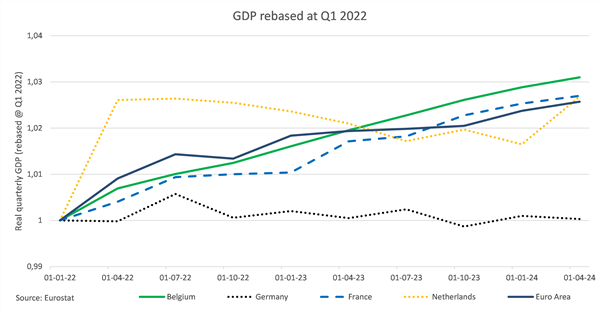Complicated neighbourly relations
2 min
Germany’s economic fortunes have a decisive impact on Belgium’s economy. In 2023, Germany was our second most important import partner, accounting for over 14% of the total statistical value of our imports, just ahead of France (13%) but far behind the Netherlands (21%). We simulated the quantitative impact of a German economic slowdown on the Belgian economy. A 1-percentage-point drop in Germany’s growth could reduce Belgian growth by 0.4%. It’s no surprise, then, that Belgian government negotiators would strongly support an urgent recovery of the German economy.
Final GDP figures
The final GDP figures for the second quarter of this year were published a few weeks ago on Eurostat’s website. Since early 2022, Belgium’s economy has grown by 3.1%, significantly outpacing the eurozone average of 2.6%. Among the major economies in the bloc, only Spain has performed better. Our Dutch and French neighbours achieved 2.7%, while Germany, once the eurozone’s engine, recorded just 0.03%.
Germany’s troubles
Growth has stalled in the eurozone’s largest economy. After another contraction in the period from April to June, Germany has now recorded five quarters of negative growth in the past nine quarters. Interestingly, every contraction has been followed by a period of (modest) growth, preventing it from being labelled as a technical recession.

The latest forecasts from our colleagues in London predict a mere 0.1% growth for Germany in 2024. This is a slight improvement from last year’s -0.1% but reflects the headwinds of tight fiscal policies and an uncertain international outlook that will continue to weigh on Germany’s growth prospects next year.
Impact on trade
Germany’s economic health is crucial for Belgium’s economy. In 2023, Germany was our second-largest import partner, accounting for over 14% of total import value, ahead of France (13%) but significantly behind the Netherlands (21%).
In terms of exports, Germany is even more important, taking the top spot: nearly one-fifth of Belgium’s total export value goes to Germany, ahead of France (14%) and the Netherlands (15%).
However, trade volumes have fallen significantly. According to the latest National Bank of Belgium (BNB) report, as of May 2024, Belgium’s total exports to Germany were €1.2 billion lower than during the same period a year earlier, a drop of nearly 15%. Similarly, Belgium’s total exports have decreased by the exact same amount. German imports have also plunged, down by more than 6.5%.
Quantitative impact
Should we be concerned about Germany’s slowdown?
We simulated the quantitative impact of a German economic slowdown on Belgium. A 1-percentage-point drop in Germany’s growth could reduce Belgium’s growth by 0.4%. Even with potential monetary compensation policies, Belgian growth would still slow by 0.3 percentage points.
This is a significant impact. If Germany’s economy had been operating at full capacity, Belgian growth over the past two years could have been much higher, reducing the gap in our national budget.
It’s clear that Belgian government negotiators have good reason to advocate for the rapid recovery of the German economy.


